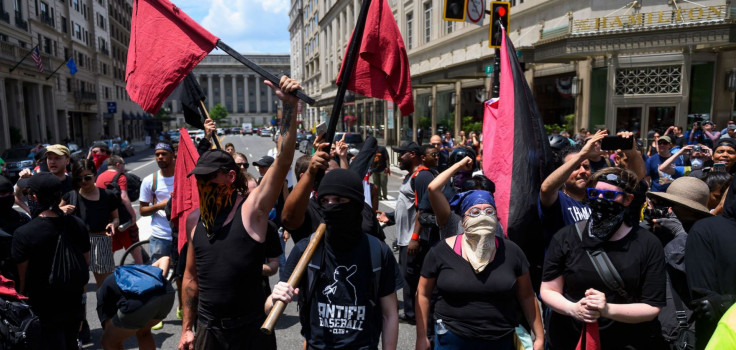'Antifa' is Short for 'Anti-Fascists': Who Are They and Why Trump Wants to Declare Them a Terrorist Organisation

US President Donald Trump has reignited controversy by pledging to designate the anti-fascist movement Antifa as a 'major terrorist organisation', despite significant legal obstacles that could render such a move unconstitutional.
Trump made the declaration during his United Kingdom visit on 17 September, calling the loosely affiliated activist network a 'sick, dangerous, radical left disaster' on his Truth Social platform. He promised investigations into 'those funding Antifa' while adhering to 'the highest legal standards and practices'.
The timing proved particularly charged, coming shortly after conservative activist Aaron Danielson was fatally shot at a Portland protest.
While authorities arrested suspect Michael Reinoehl, who was later killed by law enforcement, investigators found no confirmed links to organised Antifa activity.
Trump nonetheless blamed what he termed radical left-wing extremism for fostering violence against conservatives.
What is Antifa?
The term 'Antifa'—shorthand for anti-fascists—describes a decentralised collection of activists opposing fascism, white supremacy, and far-right extremism rather than any formal organisation.
Without central leadership, official membership rolls, or standardised tactics, the movement operates through autonomous local groups and individuals.
Its philosophical roots stretch back to European resistance movements against Nazi Germany and Mussolini's Italy during the 1920s and 1930s.
While American activists have used the label since the 1980s, the movement gained prominence during Trump's presidency, particularly following the deadly 2017 Unite the Right rally in Charlottesville, Virginia, where counter-protesters confronted white nationalists.
Constitutional Roadblocks Face Terror Designation
Legal scholars unanimously agree that designating Antifa as a terrorist organisation faces insurmountable constitutional barriers.
Federal law only permits the US State Department to designate foreign groups as Foreign Terrorist Organisations (FTOs), enabling asset seizures, travel bans, and criminal prosecutions for material support.
No mechanism exists for applying such designations to domestic movements. Creating one would likely violate First Amendment protections for free speech and assembly, according to Mary McCord, former head of the Justice Department's National Security Division.
'You cannot criminalise an ideology or political viewpoint in America', McCord told NPR. 'That's precisely what the Constitution protects'.
Political Battle Lines Form Over Designation
Republican senators have rallied behind Trump's proposal. Senator Bill Cassidy argued that Antifa exploits 'legitimate grievances to promote violence and anarchy', supporting the president's characterisation of the movement as a domestic threat requiring federal action, reports Reuters.
Democrats and civil liberties advocates counter that the designation represents dangerous overreach. The American Civil Liberties Union warned that branding Antifa as terrorists could criminalise peaceful protest and political dissent, establishing precedent for targeting any opposition movement.
Enforcement Challenges Mount Without Legal Framework
Without foreign terrorist designation powers, the administration would need alternative approaches. Options include enhanced surveillance of suspected Antifa-affiliated individuals, financial investigations into protest funding, or conspiracy prosecutions under existing federal statutes.
However, proving organisational membership or coordination becomes virtually impossible when dealing with autonomous activists sharing only broad opposition to fascism. Federal prosecutors would struggle to establish the direct links required for terrorism charges.
The FBI already investigates politically motivated violence regardless of ideology under domestic terrorism statutes. Director Christopher Wray testified that the bureau pursues 'violent extremist threats' across the political spectrum without needing new designations.
Broader Implications for Civil Liberties
Constitutional scholars warn that Trump's proposal threatens fundamental democratic principles. Designating domestic political movements as terrorist organisations would grant unprecedented powers to suppress dissent.
They argue that the precedent could enable future administrations to target any protest movement, from environmental activists to anti-abortion groups, simply by labelling them terrorists.
As debate continues in Congress and courtrooms, Trump's Antifa designation pledge highlights deepening political polarisation while raising fundamental questions about balancing security concerns with constitutional protections for protest and dissent in a democratic society.
© Copyright IBTimes 2025. All rights reserved.





















